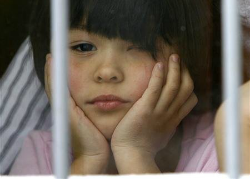
Over the last few years, the relationship between the United States and Russia in regards to international adoption has been tenuous at best. After several isolated incidents of Russian children suffering abuse, or even death, at the hands of their American adoptive parents, the State Duma passed a bill in July to help regulate international adoptions. This bill continued to allow United States citizens to adopt Russian orphans—956 of whom were adopted by U.S. citizens in 2011 alone.
However, this legislation could change dramatically. In light of President Obama’s signing of the Magnitsky Law, designed to display the United States’ intolerance for Russian human rights violators, the State Duma has drafted legislation banning all international adoption of Russian children by U.S. citizens. The law still needs to pass through two upper levels of parliament before it is presented to President Vladimir Putin for signing and enactment. However, Alexander P. Torshin, the deputy speaker of the Federation Council, predicted the bill would go through.
Russian legislators claim that the bill, named after Dima Yakovlev a Russian child who died of heat stroke after being left in the car by his U.S. adoptive father in 2008, will protect Russian orphans against similar negligence perpetuated by U.S. adoptive parents. However, many critics of the bill believe that it is less about protecting Russian children than about retaliating against the Magnitsky Law passed in the United States. Education and Science Minister Dmitry Livanov stated, “The logic is to be ‘an eye for an eye,’ but the logic is incorrect because it could harm our children who cannot find adopters in Russia.”
The United States adopts a large number of Russian orphans. In fact, between 1999 and 2011, U.S. citizens adopted 45,112 children from Russia, according to the U.S. State Department. Critics of the bill fear that only the children will suffer by closing the opportunity for U.S. international adoption of Russian orphans. Child advocate Boris Altshuler, the head of Rights of the Child, estimated that approximately 83,000 orphans in Russia will “stay in Russian children’s institutions, with tragic consequences.”
Opponents of the bill cite several factors as to why a complete ban on U.S. adoptions would be devastating to Russian orphans. Many have observed the poor condition of Russian orphanages and their over-population. In addition, critics have stated that few Russian families adopt children themselves. Further, there is a high rate of deaths among those children who are adopted by Russian families. According to the state-run news agency RIA Novosti, 1,220 adopted children have died in Russia since the 1990s. This number is staggering in comparison to the 19 Russian children adopted by U.S. citizens who have died in the same in the same stretch of time.
Clearly, the Russian people recognize the tragedy of such a ban being enacted. A Russian newspaper, Novaya Gazeta, collected 86,000 signatures in an open letter “to protect Russian children from the meanness of Russian lawmakers.” It seems many people believe Russian legislators have let politics get in the way of making the best decisions in the interest of Russian children. As Russian foreign minister Sergey Lavrov stated, “I am sure that the State Duma will make the right decision in the end. International adoption as an institution has a full right to exist.”
Stacy Harper is a 2L at Denver University Law School and a Staff Editor for the Denver Journal of International Law and Policy.

